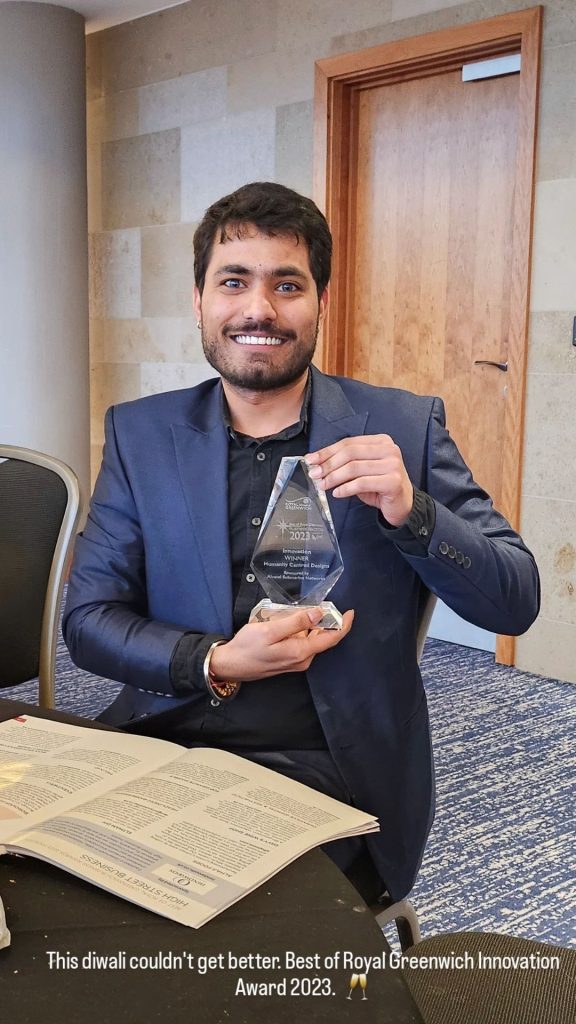(April 4, 2024) “Over 1,600,000 tonnes of textile waste is generated even before a garment reaches a consumer, and directly ends up in landfills,” said UK-based Vishal Tolambia, the founder of Humanity Centred Designs who is on a mission to enable sustainability in the garment industry. Since India is the second-largest textile manufacturing destination, one of the biggest challenges the small-scale factories face is the accumulation of pre-consumer textile waste at the manufacturing level. To solve this, Vishal has developed a technology that can convert pre-consumer textile waste to highly durable, flexible, and strong recycled material – an innovation that has earned the 26-year-old a spot in the 2024 Forbes 30 Under 30 list.
“For us, sustainability means enabling sustainable operations. It also means that we care for the planet and protect it, by making sure that 80 percent of our production is through renewable energy sources, responsible consumption of water, and minimised resource utilisation. We’re on a journey to make all fashion MSEs in India circular,” said Vishal in an interview.

Vishal Tolambia
Finding his passion
Growing up in the town of Pushkar in Rajasthan, Vishal Tolambia’s tryst with the world of fashion began at a young age. His grandfather was a trailer in a village about 25 km from Ajmer and the skills were passed onto his father, who later got into the garment manufacturing and exporting business. His early memories are of spending time at his father’s unit after school and learning the nuances. To expand his knowledge and technical know-how, he joined NIFT, Jodhpur – a place that gave wings to his ideas, so much so that he won the Best Graduation Project award for his collection inspired by Gujarat’s Rabari community.
Over the years, he understood the importance of sustainable fashion and decided to do his master’s at the University of Arts London, however, it was the lack of funds that pulled him back. But his portfolio led him to win a scholarship and thus began his journey. While pursuing an MA in Fashion Futures course, he highlighted the issue of textile waste that was generated by garment manufacturers in Pushkar. This led him to develop a novel localised circular recycling technology that converts textile waste into inventive materials—in turn, leading to the formation of Humanity Centred Designs-Textile, the world’s first recycled material from mixed pre-consumer textile waste. “After graduating, I founded Humanity Centred Designs, a material innovation hub that uses circular recycling technology to recycle textile waste from marginalized fashion MSEs in India and provide sustainable circular textile solutions,” he said in an interview.


Making a difference
In just a year, Humanity Centred Designs has supported over 150 apparel MSEs in waste management and sustainable development. “Our innovative solutions have not only helped manufacturers to reduce waste and environmental damage but also helped them to stay competitive in an increasingly environmentally-conscious market,” Vishal added as he established two retail stores in Bath and London from where they are retailing recycled apparel across six countries. With the opening of the stores, they are helping support over 3500 artisans in Pushkar working at MSEs by providing them with a global platform in an international marketplace.
Currently, the company functions as a centre for material innovation, aiding micro, small, and medium-sized apparel businesses in advancing sustainable practices through circular recycling initiatives. “The goal is to make the fashion industry more sustainable, ethical, and responsible by reducing waste, reducing pollution, and promoting fair labour practices,” added the entrepreneur, who has won the Global Citizen Prize for his outstanding efforts to promote social change.
Future plan
For someone who tries to live a sustainable lifestyle, Vishal is committed to discovering inventive approaches to minimize the environmental footprint of the fashion industry, all while prioritizing the well-being of the communities engaged in its production process. “For me, sustainability means creating a balance between the needs of the present and future generations. I believe that a sustainable mindset and practices can benefit both the environment and society, and I strive to incorporate these principles into every aspect of our business,” he added.
Having created a difference in such a short span of time, Vishal now plans to establish 15 flagship stores worldwide in order to showcase recycled textiles and promote ethical fashion. Moreover, his aspiration includes empowering more than 500 marginalized SMEs in India through the provision of circular recycling technology. “This will foster community development and environmental sustainability.”
- Follow Vishal Tomabia on LinkedIn




